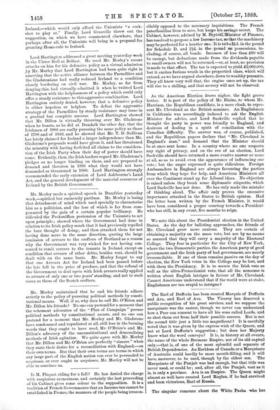As the American Election draws nigher, the fight grows hotter.
It is part of the policy of Mr. Blaine, to whom Mr. Harrison, the Republican candidate, is a mere cloak, to repre- sent Mr. Cleveland as the British nominee. An Englishman in California was accordingly induced to ask the English Minister for advice, and Lord Sackville replied that he thought the party in power was friendly to England, an desirous of dealing in a spirit Of conciliation with the Canadian difficulty. The answer was, of course, published, and the Republican papers declare that "Mr. Cleveland is England's man," and demand that the Minister should be at once sent home. In a country where no one respects any right of privacy, and on the eve of an election, Lord Sackville should have returned a more evasive answer or none at all, so as to avoid even the appearance of influencing one vote ; but the anger expressed is quite ridiculous. Foreign Ambassadors in England are always favouring the parties from which they hope for help, and American Ministers all over the Continent stand up for Liberal ideas. No objection is raised unless they break some diplomatic etiquette, which Lord Sackville has not done. He has only made the mistake of thinking aloud. The affair only proves the excessive importance attached in the States to British opinion. Had the letter been written by the French Minister, it would. have been considered a proper courtesy towards a President who has still, in any event, five months to reign.






































 Previous page
Previous page